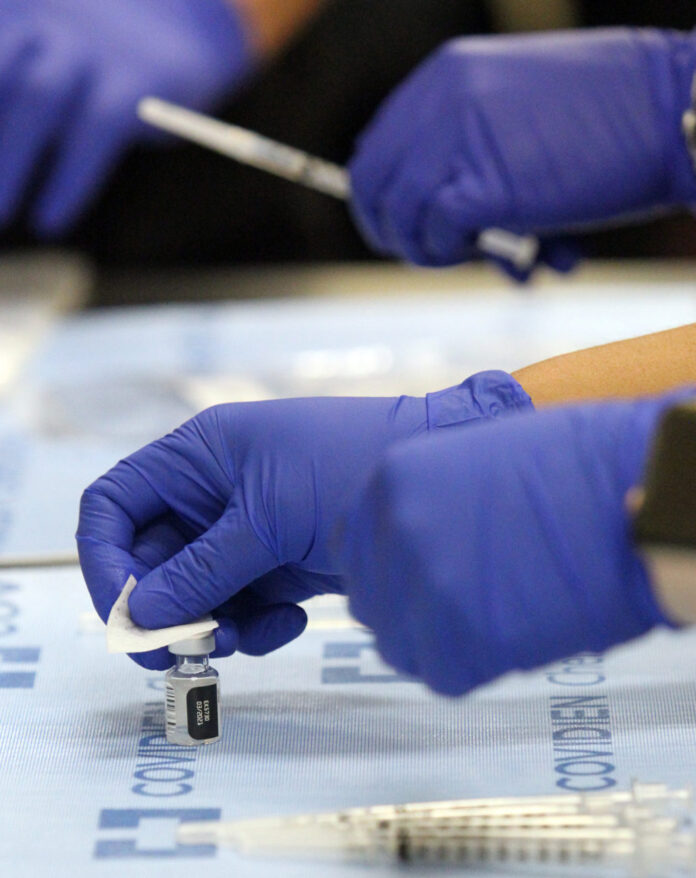As COVID-19 cases continue to mount, Starr County is set to receive their first doses of the COVID-19 vaccine as part of the state’s second week of allocations.
The county is set to receive 700 doses of the vaccine manufactured by Moderna which was approved for emergency use by the U.S. Food and Drug Administration on Friday.
Most of the providers in Starr County that will be distributing the vaccine are located in Rio Grande City including a clinic run by the Department of State Health Services, Family Health Center, Family Medical and Specialty Clinic, H-E-B Pharmacy, and Valley Health Clinic.
Additionally, the Roma Family Health Clinic will also be receiving doses of the vaccine.
Hidalgo and Cameron Counties will also receive hundreds of doses this week after having already received doses of the vaccine manufactured by Pfizer and BioNTech — the first vaccine to receive emergency-use authorizations by the FDA — during the fist week of distribution.
But when these Moderna vaccine doses will arrive in the Rio Grande Valley is still unclear.
“From what they told us in a meeting yesterday, they will be starting to ship out on Monday,” Dr. Emilie Prot, regional medical director for Public Health Region 11, said during a weekly news conference call on Friday. “Will we receive it on Monday? Hopefully. We’re not 100% sure because on the weekends, some of the shipping slows down.”
Prot said health officials would be reaching out to people in the first tier of vaccine distribution such as hospital staff working directly with patients who are COVID-19 positive and at high risk of COVID.
“The goal is to follow the … COVID-19 Vaccine Allocation Guiding Principles and Healthcare Worker Definitions,” she said. “So these were put forward by the expert vaccine allocation panel.”
Those in the first tier also include physicians, nurses, respiratory therapists, and other support staff such as custodial staff who go into hospital rooms and aids who distribute medication.
“Those who are exposing themselves on a daily basis,” Prot said. “Anyone going in and out of those COVID units.”
After that would be long-term care staff working directly with the vulnerable residents.
“Those are the direct care providers — physicians, nurses, personal care assistants,” Prot said. “And number 3 is going to be EMS providers who engage in 911 emergency services, home health care workers including hospice — because we have still a lot of people who are dying from COVID-19, so those healthcare workers — and then the residents of long-term care facilities.”
But whether those who are eligible will actually take the vaccine is another question as approximately 25% of DHR Health staff indicated they did not want to take the vaccine.
Prot addressed some common questions and concerns about taking the vaccine.
If someone is currently infected with COVID-19 or they have been exposed, Prot said they should remain in isolation.
“They need to be isolated for those 10 days from the test collection date,” she said.
“After that, yes the vaccine is indicated and you can get vaccinated for COVID-19,” Prot added, noting that the immune response from the vaccine is more effective than the defense developed from natural infection.
“An immune system is a lot better than the natural infection,” she said.
For those who have received antibody therapy for COVID, she said there hasn’t been any research on that yet so the recommendation would be to receive the vaccine after but only after 90 days since their initial infection.
Pregnant individuals are also recommend for vaccination especially since they are known to be at risk to develop severe symptoms from the disease.
“Right now it’s all about risk and benefits and we know that the risk of COVID-19 is very severe for all of these patient groups,” Prot said, “and so it’s important to get vaccinated and the CDC recommends vaccinating for these specific special populations or vulnerable populations.”
She added that it is recommend for those who are pregnant to have a conversation with their healthcare provider but it is not required prior to vaccination.
There have been reports of allergic reactions to the Pfizer coronavirus vaccine which are under investigation by the FDA but Prot said that people who previously had an anaphylactic reaction to an injectable are still recommended to get the vaccine.
“So if they had a prior anaphylactic reaction to an injectable, they can still receive the vaccine if it wasn’t a vaccine-induced anaphylactic reaction,” Prot said, “but they need to be observed for a longer period of time so instead of the 15 minutes after they receive the injection, it would be 30 minutes.”
But if someone does have an allergic reaction to the COVID vaccine, she said they should withhold from receiving the second dose.
“Of course we do observe all of the adverse events,” Prot said. “This is a national system and it is a robust system and it has been for all of the other vaccines as well.”





